UHD Source block
Description
The UHD Source block is used to receive data from a USRP. The block acts as a frontend for the uhd_source S-function. ![]()
| Select Tab Pane... |
|---|
Dialog Box
The dialog box can be used to set the parameters of the USRP. The default use-case of the UHD Source block will be in connection with one USRP. In this case, all parameters have just one value (e.g. carrier frequency 2.41e9). In the MIMO-case or when using USRPs with multiple receive channels, also multiple values for one parameter are possible (e.g. carrier frequency [2.41e9 2.42e9]). For multiple value use the common MATLAB vector notation [param1 param2 ...]. If just one value is specified, it will be used for all channels or respectively for all devices.Device Tab Pane
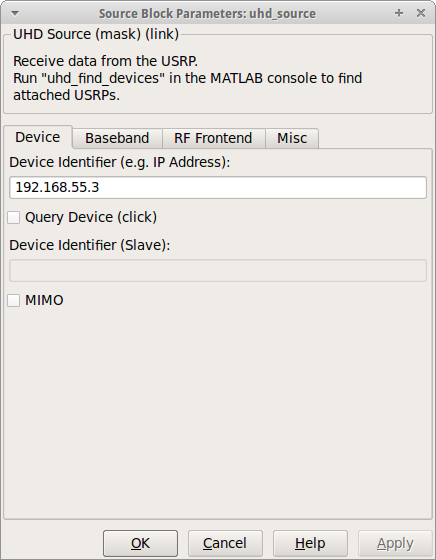
Device Identifier (e.g. IP Address)
-
Specify the identifier of the attached USRP. Possible identifiers are the IP Address (e.g. addr=192.168.55.3), the Serial Number (e.g. serial=EGR18WFRP), the Type (e.g. type=usrp2), or the Device Name (e.g. name=myUSRP). Available devices are displayed in the block description. The identifier should be non-ambiguous. In the case of an IP Address, the hint addr= can be omitted.
- Query Device
-
The Query Device checkbox acts like a push-button and displays information and parameters about the USRP (according to the identifier) using the USRP explorer. The parameters can be used to complete the whole UHD Sink mask. (Just to make sure, the checkbox can't be selected.)
- Device Identifier (Slave) and MIMO
-
Specify the IP address of the USRP slave device. This option becomes available by selecting the MIMO checkbox. To clearly set the master and the slave device, the hints should be numbered, example: Master addr0=192.168.55.2, Slave addr1=192.168.55.3.
Baseband Tab Pane
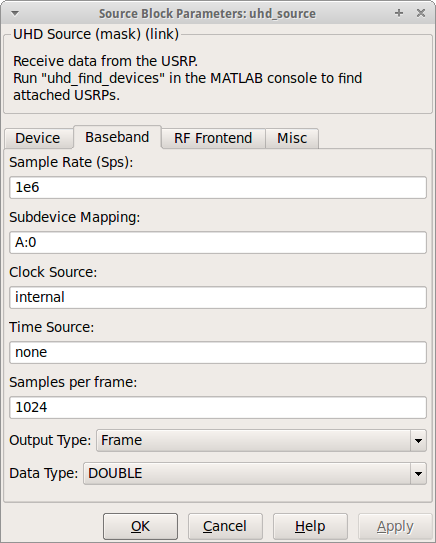
Sample Rate
-
Set the rate in Samples per second (Sps) of the received samples from the USRP. The underlying S-function will determine an appropriate decimation factor. The S-function will produce a warning in the MATLAB command window, if the exact decimation factor isn't possible.
- Subdevice Mapping
-
Determine the signal path between the antenna and the ADC. In the UHD context, each path is designated as channel. Channels are consecutively numbered starting from 0. The subdevice mapping is a vector of strings as follows: [Dboard_1:Subdev_1 Dboard_2:Subdev_2 ...]. The path Dboard_1:Subdev_1 is mapped to channel 0 (since it is the first position in the vector), Dboard_2:Subdev_2 is mapped to channel 1, and so on.
Example: With the output of the USRP explorer (tree), one possible subdevice mapping could be: [A:0].
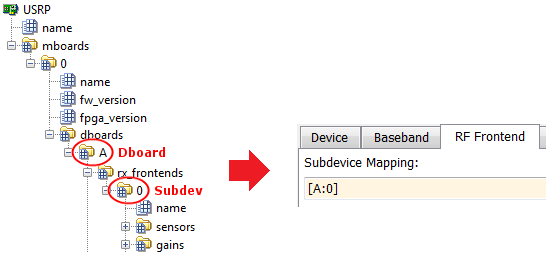
Sample per frame
-
Specify the number of samples per frame of the block output (e.g. 512).
- Output Type
-
Choose between a frame-based or a vector-based output. See the MATLAB documentation for more information.
- Data Type
-
Set the output data type.
- Clock Source
-
Specify the clock source of the USRP (e.g. internal). See the board documentation for more information.
- Time Source
-
Specify the time source of the USRP (e.g. none). See the board documentation for more information.
RF Frontend Tab Pane
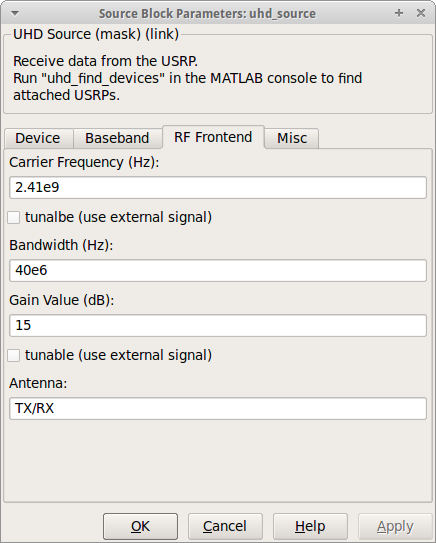
Carrier Frequency (Hz)-
Specify the carrier frequency of the received signal (e.g. 2.41e9). Set the tunable checkbox to tune during runtime using an additional input port
- Bandwidth (Hz)
-
Set the bandwidth of the daughterboard (e.g. 40e6). See the daughterboard documentation for more information.
- Gain Value (dB)
-
Specify any gain or attenuation within the gain range of the daughterboard (e.g. [10]). Set the tunable checkbox to change the gain during runtime using an additional gain input port.
- Antenna
-
Specify the antenna of the mounted daughterboard (e.g. TX/RX). See the daughterboard documentation for more information.
Misc Tab Pane
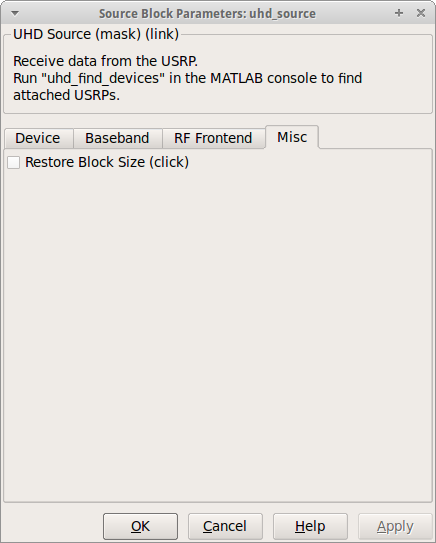
Restore Block Size-
Restore the geometric size of the UHD Source block. The checkbox acts like a push-button and hence can't be set.

